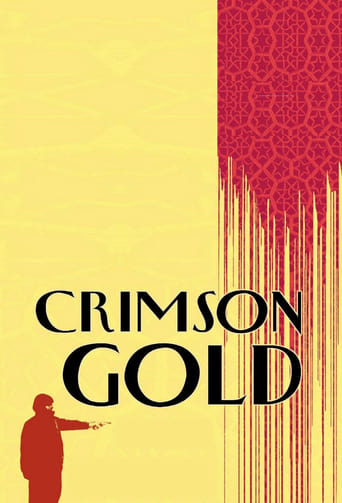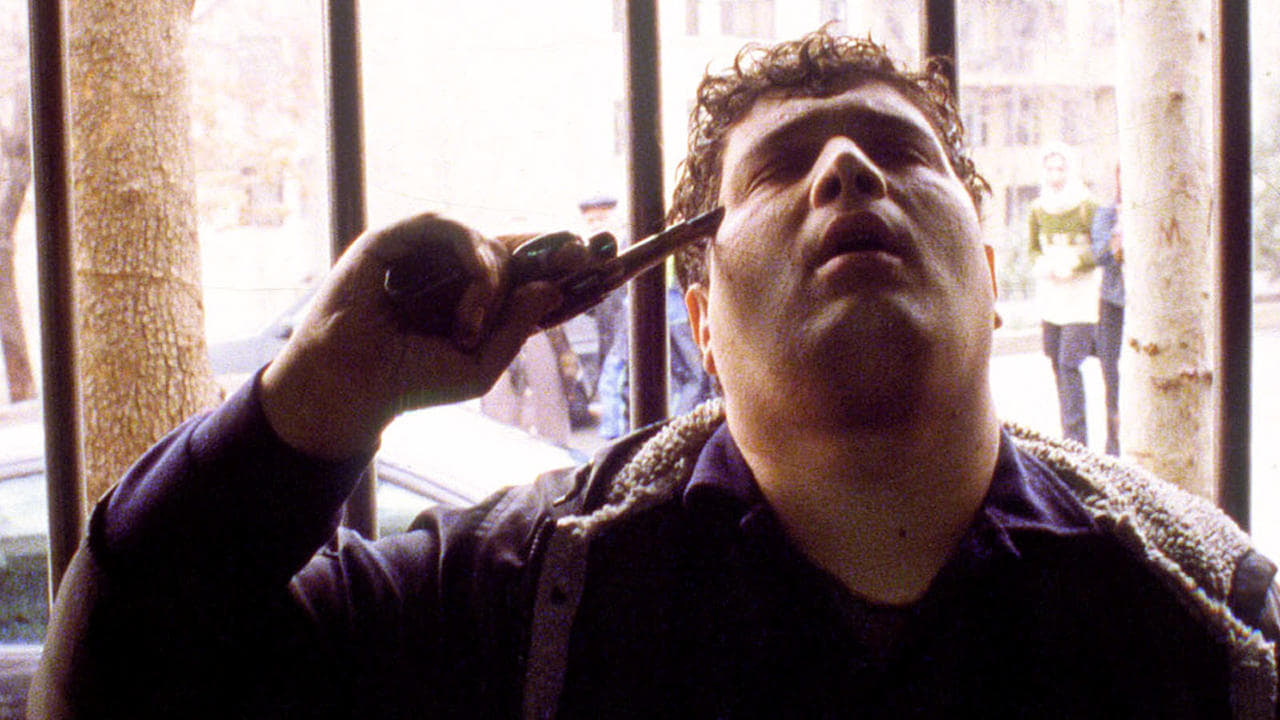Pierre Radulescu
It starts like a film noir, a scene of robbery with an absurd outcome, excellently shot, with an incredible rhythm, with guts, and one could expect the movie will go on this way, kind of Quentin Tarantino on the steroids. Actually this starting scene, coming again at the end, is the moment of explosion in the story.Crimson Gold, released in 2003, with Jafar Panahi as director and Abbas Kiarostami as screenwriter; it is the second movie of this tandem that I've watched (the other was The White Balloon). Two films showing a society that rejects the people who don't fit in the canons. In The White Balloon it's the Afghan boy (only there the idea is subtly hidden up to the end). Here in Crimson Gold, it's Hussein, the pizza delivery guy, who is played by a non-professional, Hossain Emadeddin. Like his personage, he is in real life a pizza delivery man. Like his personage, he is under medication for a form of schizophrenia. His performance is remarkable. Looking always like he's carrying all his household with him everywhere he goes, while able exactly this way to induce the feeling that he is his own guy. Silent, quiet, apparently in total selfcontrol, while able exactly this way to communicate to us his terrible tensions that boil in himself and make him a walking time-bomb.As a schizophrenic, Hussein sees the society through his own mirror (and the idea of shooting him so often through the shield of his motorbike is genial). Actually, that shield acts both ways: Hussein is in turn the perfect mirror of the society surrounding him. It is a society sick of the same schizophrenia, an absurd universe where everybody is hostile to all the others, parents are denouncing their children, police arrest anybody for anything, simple people float freely toward petty crime, rich people are surrounded by a richness that is absurd by lack of meaning.Each sequence of the movie calls for a moment of disruption, you cannot stand to such absurdity, you have to explode, and there are small disruptions all along, culminating with the big one, the failed robbery.It's not only about Iran, as many reviewers consider. This film is a metaphor, and a metaphor is universal. The movie is banned in Iran while its director was not allowed to enter US to assist at the screening there. Director Jafar Panahi is banned in his own country and is suspected elsewhere as coming from his own country.The robbery scene that links the beginning and the end of the movie shows a universe that is circular with no way to escape (also in The White Balloon the first and the last scenes are the same). It's an extremely nihilistic movie: there is no superior order (cosmic or divine) to show us the way, to offer us solace, to teach us higher wisdom. The whole universe is a walking time-bomb.
oOgiandujaOo_and_Eddy_Merckx
In September of 1980, as pretty much the first military operation of the Iran-Iraq war by ground forces, Iraqi forces captured the border post at Shalamcheh. Shalamcheh was later to be the site of the largest battle of the war, Operation Karbala-5. A passing reference to Crimson Gold's main character, Hussein, having been at Shalamcheh is made in the film. So what's quite easy to miss here, for a casual Western viewer, is that protagonist Hussein Emadeddin, sometime pizza deliveryman, is a war veteran. An Iranian viewer would be expecting this anyway; it was a huge war that engulfed the generation that Hussein belongs to. Not that many Iranians will see this movie, all Panahi's films are banned in his homeland. Shalamcheh is a resonant name to Iranians, and now contains a war memorial which many travel to. Part of the battle involved "human waves" which is to say lightly armed men, in large quantities charging the well-fortified Iraqi positions, basically suicide attacks. There are stories during the war of young men, apparently volunteers, charging the minefields, in order to clear them for the more experienced soldiers.The Iran Iraq war was a particularly unpleasant throwback: commentators have compared it to World War One due to the predomination of trench warfare. In both wars for example there was the use of mustard gas, machine gun nests, shelling, and barbed wire. I think it's pretty much implied that Hussein has been a victim of the war. He's been taking cortisone on a long term basis. Due to the copious side effects, you don't do that unless there's something severely amiss, he would have to have a severe long term illness. Prolonged use of cortisone can be prescribed to treat severe lung disorders, I would suggest that Hussein may well have been gassed (hundreds of thousands of Iranian soldiers were gassed by sulphur mustard during the war, plus mustard was used at Shalamcheh during Operation Karbala-5, on civilian populations as well as Iranian troops). The side effects of long term cortisone use include insomnia irritability, depression, swelling, obesity, diabetes, and depressed immune response. At one point Hussein has to climb four stories to deliver a pizza when a lift is out of order and the tenant won't come down; in the light of his condition, this appears rather more tragic. The character is very easy to sympathise with because, Hussein Emadeddin is played by Hussein Emadeddin, also a pizza deliveryman with severe health problems. There's a lot of realism here.When thinking of post-war art in film, the term noir floats to the surface. Noir developed as an art form, if not necessarily an aesthetic, as a response to the zeitgeist of the Second World War's aftermath. An anonymous individual from the University Of San Diego has put it better than I can: "The historical setting is the contemporary world that has been corrupted and lost its moral certainty. The prevailing cynicism of characters reflects the reality of the atomic bomb, Cold War, totalitarianism, propaganda, Hollywood blacklist, corrupting power of the government and press. World War II fragmented men, caused them to feel adrift, insecure, alienated, a feeling of having "gone soft" and lacking power to control their lives. The liberal movement was in crisis, due to powerful forces of communism and materialism, causing a loss of faith in progress and man's innate goodness." Since the war there's been a crisis for the liberal cause in Iranian society, which is referenced at one point by Hussein's friend Ali, who asks what it was like in (pre-theocratical) times when women walked around naked (without veils). It's clear that there's not much fun in the Iran of this world, in one scene Hussein asks a fifteen-year-old policeman if he's ever had fun, the young chap isn't even sure what the word means, and I think that makes two of them.Despite Hussein having been pretty much left on the scrapheap, rotting in a dingy apartment to the tune of squeaking rats, he's a nice guy, and tries his best to be kind to folk. However, after a series of humiliations, he has had enough and commits a hideous folly. It's a film about injustice that manages to be, at the same time, warm-hearted, staggeringly beautiful and polemical. You can really take Hussein Emadeddin into your heart. Which is rare in a cinematic world where men are often armour plated and hard to love.My respects for a profoundly humane film. Quite ironically it appears that Jafar Panahi was arrested within the last week whilst giving a dinner party at his home, an absurdity that you might think would make a good scene in a Panahi movie.
lonelymountain
Jafar Panahi is one of the best directors of Iran,his works are upon the best movies of the world,showing the social problems of Iran,after wards Sohrab Shahid Sales is the best choice for watching movies,Crimson gold is the story of Hossein a soldier in Iran-Iraq war who got toxicated by chemical bombs is a mugger,and he delivers pizzas when doing his job he confronts completely different situations which his within is dazzled by them,he saw his friend which he wad a soldier too ,in a luxurious house,Hossein delivered pizza to his house and the price was 20.5 $,he paid him 21 bucks instead an d told him ,keep the tip,he saw the pain if society,he saw the pain within,every time he went to the jewellery's galleries he confronted with shocking prices, this movie is unrealizable for foreigners because they don't know the picture of our society and it's levels, first our society had three levels but the second level is vanishing and there will be only the level that lives in poverty ,and the level that is vomiting money, this movie is not the best movie,it's good but it has some boring scenes,but the direction,camera angles are good, this movie has somethings hided behind the scenes,you should know Iran to see this movie by the way i give it 7.2 out of 10
aydin-t
from the director of "The circle" and "The White balloon" comes another revolutionary film from the Iranian cinema, there are aspects in this film that only an Iranian would understand, or someone who is familiar with the situation in Iran, and how it crosses the red line many times. The film shows the huge gap in the society in Iran between the rich and the poor, too bad that this film attracts the wrong audience, some watch this film and expect the film to continue like what it was in the first few minutes. Another factor that makes this movie so great in the Iranian cinema is the techniques used in it, there were camera works that had never been done in the Iranian cinema, refer to the scene in which Hossein was lying in his bed to see this. overall i think this was a great movie and it gets a 10 out of 10 from my unbiased point of view.


 AD
AD


